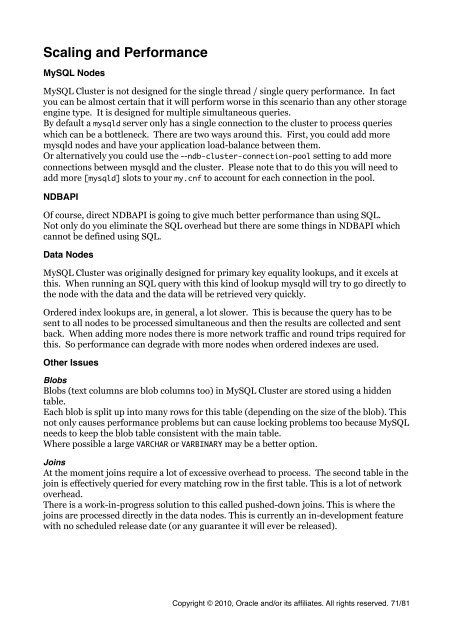MySQL Cluster Tutorial - cdn.oreillystatic.com
MySQL Cluster Tutorial - cdn.oreillystatic.com
MySQL Cluster Tutorial - cdn.oreillystatic.com
Create successful ePaper yourself
Turn your PDF publications into a flip-book with our unique Google optimized e-Paper software.
Scaling and Performance<br />
<strong>MySQL</strong> Nodes<br />
<strong>MySQL</strong> <strong>Cluster</strong> is not designed for the single thread / single query performance. In fact<br />
you can be almost certain that it will perform worse in this scenario than any other storage<br />
engine type. It is designed for multiple simultaneous queries.<br />
By default a mysqld server only has a single connection to the cluster to process queries<br />
which can be a bottleneck. There are two ways around this. First, you could add more<br />
mysqld nodes and have your application load-balance between them.<br />
Or alternatively you could use the --ndb-cluster-connection-pool setting to add more<br />
connections between mysqld and the cluster. Please note that to do this you will need to<br />
add more [mysqld] slots to your my.cnf to account for each connection in the pool.<br />
NDBAPI<br />
Of course, direct NDBAPI is going to give much better performance than using SQL.<br />
Not only do you eliminate the SQL overhead but there are some things in NDBAPI which<br />
cannot be defined using SQL.<br />
Data Nodes<br />
<strong>MySQL</strong> <strong>Cluster</strong> was originally designed for primary key equality lookups, and it excels at<br />
this. When running an SQL query with this kind of lookup mysqld will try to go directly to<br />
the node with the data and the data will be retrieved very quickly.<br />
Ordered index lookups are, in general, a lot slower. This is because the query has to be<br />
sent to all nodes to be processed simultaneous and then the results are collected and sent<br />
back. When adding more nodes there is more network traffic and round trips required for<br />
this. So performance can degrade with more nodes when ordered indexes are used.<br />
Other Issues<br />
Blobs<br />
Blobs (text columns are blob columns too) in <strong>MySQL</strong> <strong>Cluster</strong> are stored using a hidden<br />
table.<br />
Each blob is split up into many rows for this table (depending on the size of the blob). This<br />
not only causes performance problems but can cause locking problems too because <strong>MySQL</strong><br />
needs to keep the blob table consistent with the main table.<br />
Where possible a large VARCHAR or VARBINARY may be a better option.<br />
Joins<br />
At the moment joins require a lot of excessive overhead to process. The second table in the<br />
join is effectively queried for every matching row in the first table. This is a lot of network<br />
overhead.<br />
There is a work-in-progress solution to this called pushed-down joins. This is where the<br />
joins are processed directly in the data nodes. This is currently an in-development feature<br />
with no scheduled release date (or any guarantee it will ever be released).<br />
Copyright © 2010, Oracle and/or its affiliates. All rights reserved. 71/81
















